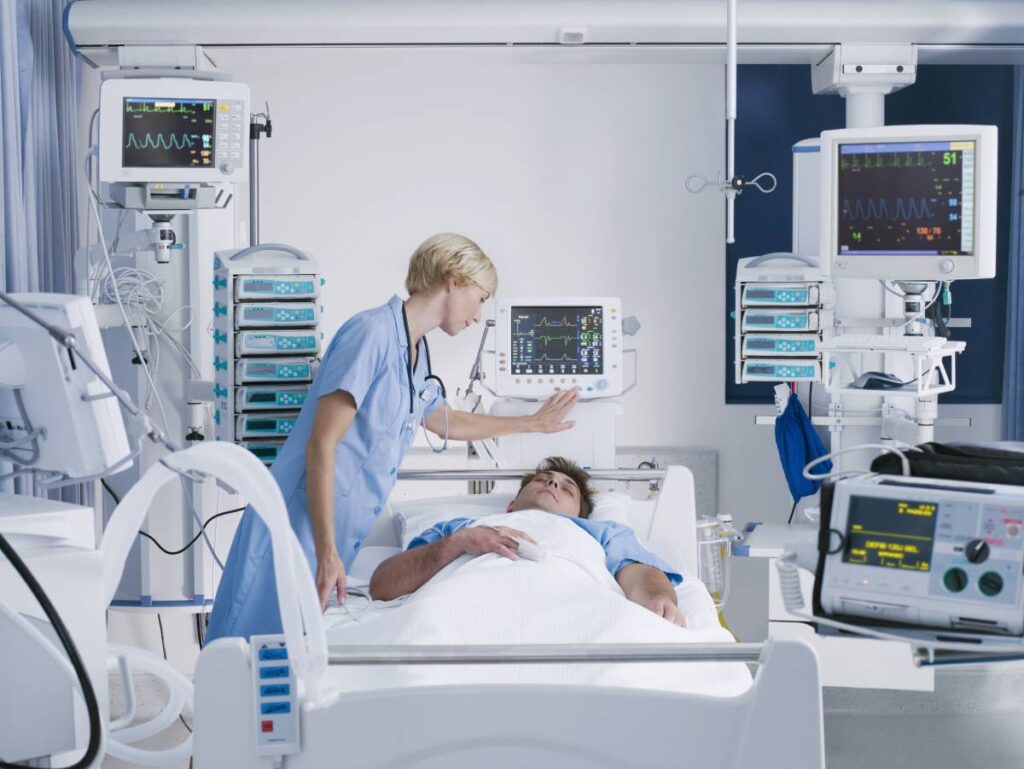Systemic Inflammatory Response Syndrome (SIRS) is a serious inflammatory condition that affects the entire body. A patient is diagnosed with SIRS if they meet 2 or more of the following criteria outlined by the 1992 American College of Chest Physicians/Society of Critical Care Medicine consensus conference: the patient’s temperature is greater than 38°C (100.4°F) or less than 36°C (96.8°F), the patient’s heart rate is greater than 90 beats per minute, the patient has a respiratory rate greater than 20/min or a PaCO2 less than 32 mm Hg, and the patient’s white blood cell count is greater than 12.0*109/L or less than 4.0*109/L, or if more than 10% are immature band forms.[1] Though it has historically been associated with infection, SIRS can also be induced by noninfectious stressful stimuli such as trauma, burn, and surgical stress. The last of these noninfectious stimuli have recently come into focus in clinical research because SIRS has been implicated as a warning sign of serious postoperative complications, including multiple organ failure and death.[2] Thus, it has become critical to investigate both the correlation between the presence of SIRS and post-surgical outcomes, as well as factors which can contribute to or help prevent the postoperative onset of SIRS.
In 1995, Rangel-Frausto et al. conducted a prospective cohort study in the medical, cardiothoracic, and general surgery wards in which they identified the first evidence of a clinical progression from SIRS to sepsis to severe sepsis and septic shock.[3] Two years later, Haga et al. conducted a retrospective study which showed that, for two hundred and ninety-two patients who received elective common gastrointestinal surgery, SIRS that continued or reoccurred after the third postoperative day, and particularly SIRS that continued for two consecutive days after the third postoperative day, had a strong predictive value for serious postoperative complications. These researchers also found that complications associated with SIRS or prolonged (>30 days) SIRS was associated with multiple organ dysfunction syndrome (MODS).[4] A later study from the Tokyo Dental College confirmed this predictive value of SIRS in orthognathic, as well as gastrointestinal, studies,[2] and other research has identified systemic inflammatory response syndrome as a predictive or operative factor in postoperative mortality and morbidity following cardiac surgeries such as cardiopulmonary bypass.[5–7]
Given the strong predictive association between postoperative systemic inflammatory response syndrome and postoperative complications, much recent research has been focused on identifying risk factors and protective factors for SIRS after a surgical procedure. For instance, in a retrospective cohort study of 28513 patients, Dieleman et al. found that increased patient age is strongly associated with a decreased risk of postoperative SIRS. They attributed this negative association to the fact that younger patients generally exhibited an increased immune response, which could contribute to a greater likelihood of an exaggerated inflammatory response.[8] Talmor et al. found that twenty-four hours of ICU resuscitation resulted in lower SIRS scores, which in turn was associated with better postoperative outcomes, including an apparent reduced risk in organ dysfunction and in protracted hospitalizations.[9] Finally, Smajic et al. found that patients undergoing an emergency laparoscopic cholecystectomy, while showing lower levels of stress caused by the surgical procedure itself, demonstrated greater levels of stress in the perioperative period and a higher incidence of SIRS than patients who experienced an elective laparoscopic cholecystectomy. This finding suggested that levels of emotional stress, and not simply the physical stress inflicted by a surgery, could contribute to the onset of SIRS and to associated postoperative complications.[10]
References
(1) Bone, R. C.; Balk, R. A.; Cerra, F. B.; Dellinger, R. P.; Fein, A. M.; Knaus, W. A.; Schein, R. M. H.; Sibbald, W. J. Definitions for Sepsis and Organ Failure and Guidelines for the Use of Innovative Therapies in Sepsis. Chest 1992, 101 (6), 1644–1655. https://doi.org/10.1378/chest.101.6.1644.
(2) Kasahara, K.; Yajima, Y.; Ikeda, C.; Kamiyama, I.; Takaki, T.; Kakizawa, T.; Shibahara, T. Systemic Inflammatory Response Syndrome and Postoperative Complications after Orthognathic Surgery. Bull. Tokyo Dent. Coll. 2009, 50 (1), 41–50. https://doi.org/10.2209/tdcpublication.50.41.
(3) Rangel-Frausto, M. S.; Pittet, D.; Costigan, M.; Hwang, T.; Davis, C. S.; Wenzel, R. P. The Natural History of the Systemic Inflammatory Response Syndrome (SIRS): A Prospective Study. JAMA 1995, 273 (2), 117. https://doi.org/10.1001/jama.1995.03520260039030.
(4) Haga, Y.; Beppu, T.; Doi, K.; Nozawa, F.; Mugita, N.; Ikei, S.; Ogawa, M. Systemic Inflammatory Response Syndrome and Organ Dysfunction Following Gastrointestinal Surgery: Crit. Care Med. 1997, 25 (12), 1994–2000. https://doi.org/10.1097/00003246-199712000-00016.
(5) Sablotzki, A.; Friedrich, I.; Mühling, J.; Dehne, M. G.; Spillner, J.; Silber, R. E.; Czeslik, E. The Systemic Inflammatory Response Syndrome Following Cardiac Surgery: Different Expression of Proinflammatory Cytokines and Procalcitonin in Patients with and without Multiorgan Dysfunctions. Perfusion 2002, 17 (2), 103–109. https://doi.org/10.1177/026765910201700206.
(6) Squiccimarro, E.; Labriola, C.; Malvindi, P. G.; Margari, V.; Guida, P.; Visicchio, G.; Kounakis, G.; Favale, A.; Dambruoso, P.; Mastrototaro, G.; Lorusso, R.; Paparella, D. Prevalence and Clinical Impact of Systemic Inflammatory Reaction After Cardiac Surgery. J. Cardiothorac. Vasc. Anesth. 2019, 33 (6), 1682–1690. https://doi.org/10.1053/j.jvca.2019.01.043.
(7) Warltier, D. C.; Laffey, J. G.; Boylan, J. F.; Cheng, D. C. H. The Systemic Inflammatory Response to Cardiac Surgery. Anesthesiology 2002, 97 (1), 215–252. https://doi.org/10.1097/00000542-200207000-00030.
(8) Dieleman, J. M.; Peelen, L. M.; Coulson, T. G.; Tran, L.; Reid, C. M.; Smith, J. A.; Myles, P. S.; Pilcher, D. Age and Other Perioperative Risk Factors for Postoperative Systemic Inflammatory Response Syndrome after Cardiac Surgery. Br. J. Anaesth. 2017, 119 (4), 637–644. https://doi.org/10.1093/bja/aex239.
(9) Talmor, M. Relationship of Systemic Inflammatory Response Syndrome to Organ Dysfunction, Length of Stay, and Mortality in Critical Surgical Illness: Effect of Intensive Care Unit Resuscitation. Arch. Surg. 1999, 134 (1), 81. https://doi.org/10.1001/archsurg.134.1.81.
(10) Smajic, J.; Tupkovic, L.; Husic, S.; Avdagic, S.; Hodzic, S.; Imamovic, S. Systemic Inflammatory Response Syndrome in Surgical Patients. Med. Arch. 2018, 72 (2), 116. https://doi.org/10.5455/medarh.2018.72.116-119.

